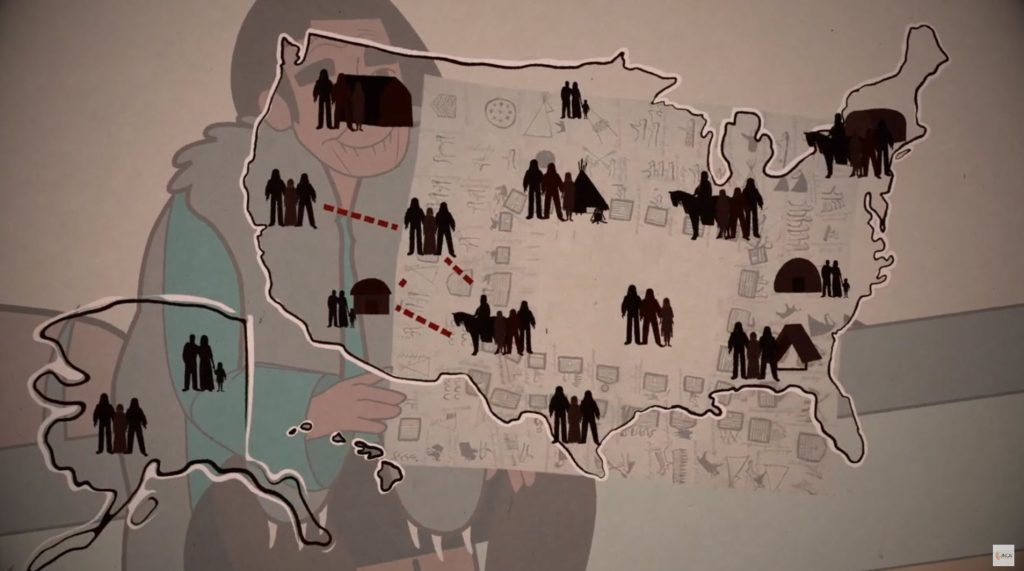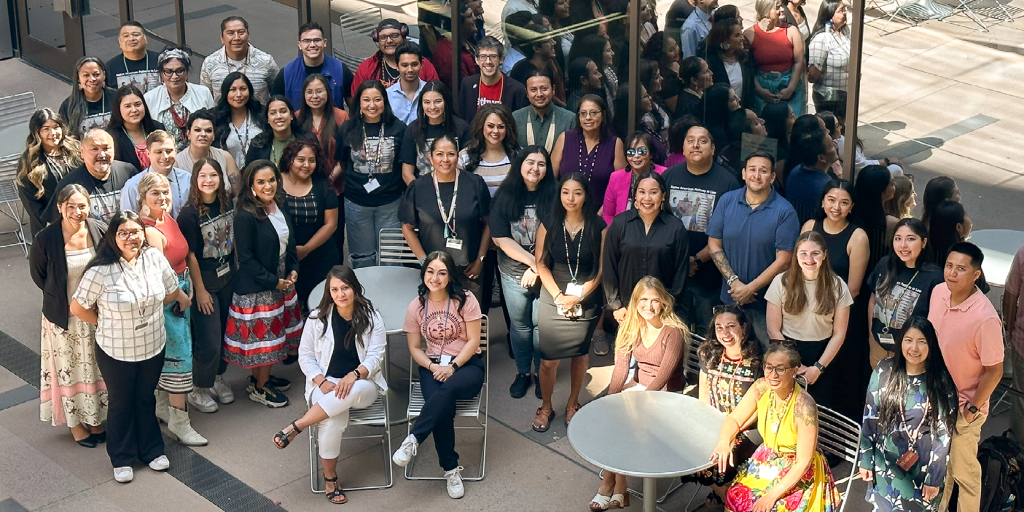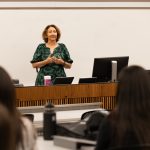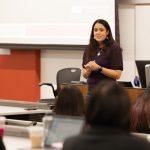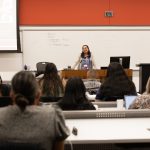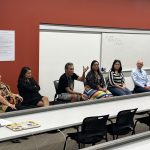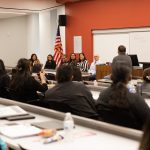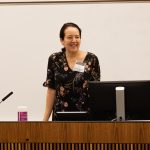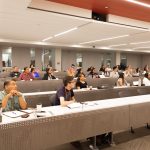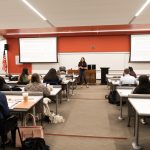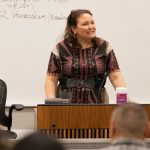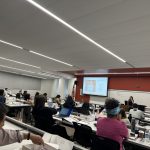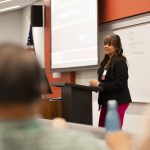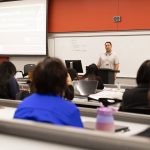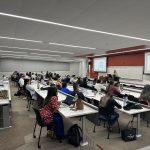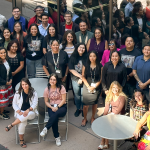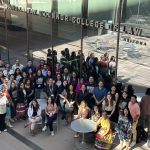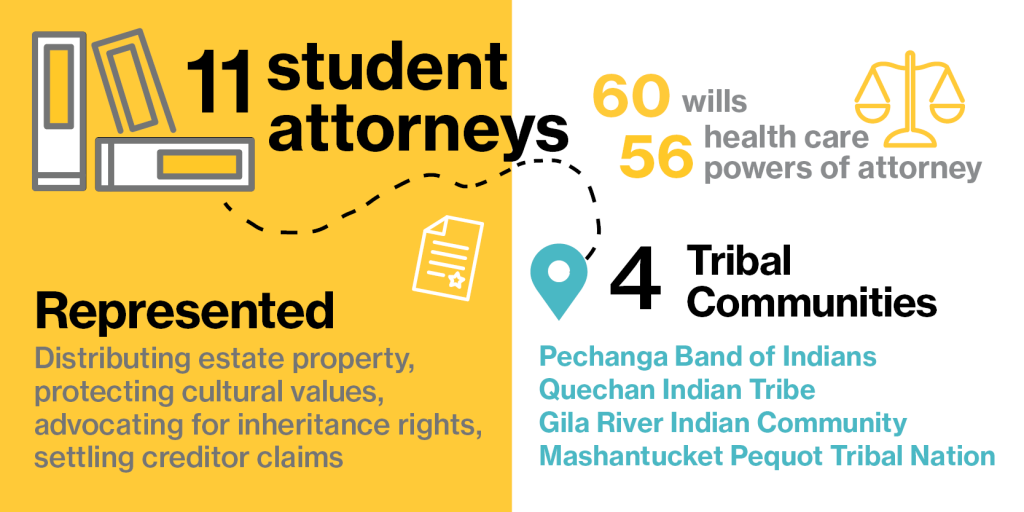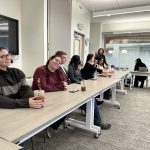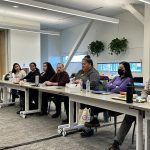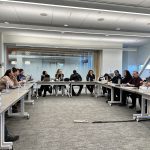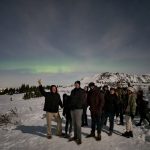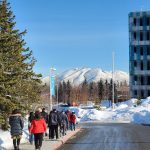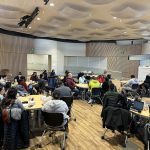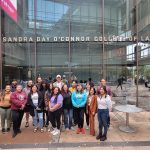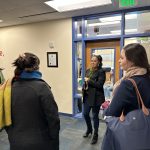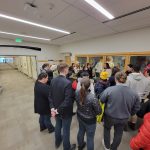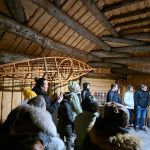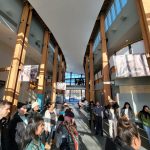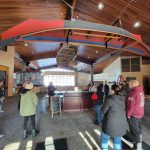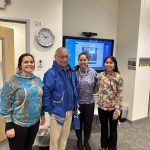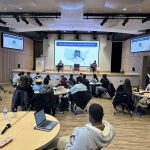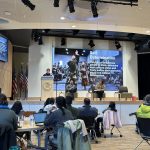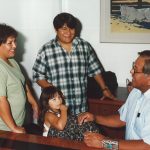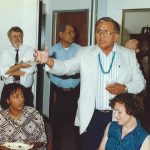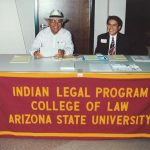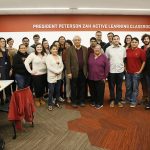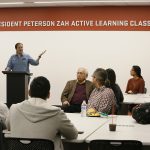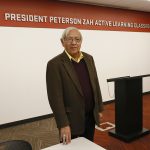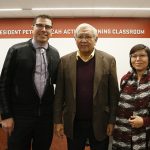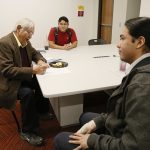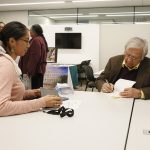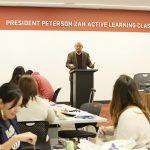Category Archives: Information
Native American Pathway to Law Initiative: Student Success Stories
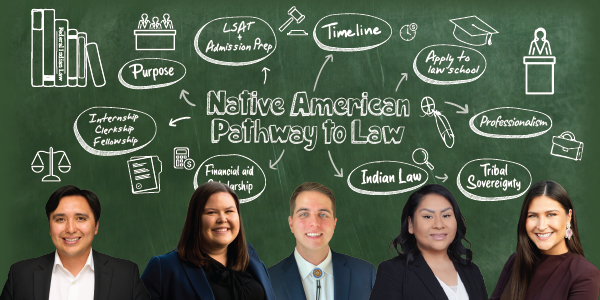
The Native American Pathway to Law team is excited to host a five-day Pathway to Law Workshop from June 5–9 at the University of California, Berkeley School of Law in Berkeley, California. This workshop offers resources, application review, LSAT preparation, financing information and more—all in a non-recruitment environment. We encourage aspiring law students to participate in this free workshop.
Five law students share their experiences of how the Pathway Way to Law Workshop solidified their decision to go to law school and provided the tools necessary to strengthen their admissions application.
Eldred D. Lesansee, Pathway to Law Workshop ’19
Ashlee Fox, Pathway to Law Workshop ’20
Geoffrey Bacon, Pathway to Law Workshop ’19
Robin Bilagody, Pathway to Law Workshop ’19
Morgan Oakes, Pathway to Law Workshop ’21
Their success ensures that future Native American students can grow up seeing someone who looks like them and embody the power of possibility for the future of Indian Country.
We welcome any aspiring law students to apply at: law.asu.edu/pathwaytolaw
Application deadline is March 15.
Job opportunity: Attorney-Adviser
Department of the Interior
Office of the Solicitor
Phoenix, AZ
This position is in the excepted service and not subject to competitive service procedures.
Merit promotion procedures do not apply.
This vacancy may be used to fill additional positions as vacancies become available.
As an Attorney-Adviser with the Department of the Interior, Office of the Solicitor, Intermountain region, Phoenix Field Office, located in Phoenix, AZyour specific duties will include:
- Providing advice on and legal services for matters pertaining to the various agencies within the Department of the Interior, primarily for, but not limited to, the Bureau of Land Management and the Bureau of Reclamation.
- Providing advice and legal services on the topics of public lands management and western water law relating to laws and regulations of general applicability to Federal agencies, such as the Federal Land Management and Policy Act, National Environmental Policy Act, Endangered Species Act, Migratory Bird Treaty Act, National Reclamation Act, and other relevant federal laws.
- Providing litigation support on behalf of the Secretary of the Interior and various Interior agencies, including the Bureau of Land Management and the Bureau of Reclamation, to the Department of Justice and practicing before the Interior Board of Land Appeals.
- Involves knowledge of water law; public lands law; federal and state litigation procedure; the federal Indian trust responsibility and statutes relating to interactions between the federal government and Tribes; federal environmental laws; real property laws; contracts, financial assistance, and cooperative agreements.
- Requires the ability to analyze legal requirements and succinctly provide advice and counsel to technical/non-legal professionals; and the ability to interact and negotiate with outside entities, including Tribes, States, and local governmental entities, regarding contracts, agreements, and other matters.
For full job description and to apply, go to Job Posting.
Call for articles

The Law Journal for Social Justice (LJSJ) at Arizona State University’s Sandra Day O’Connor College of Law is seeking articles, notes, or comments for our Spring 2024 issue. We publish articles on a range of interdisciplinary topics at the intersection of law and social justice. In our Spring 2024 publication, we are looking for articles on topics centering around violent crime, Indigenous issues, and social justice.
If you would like to submit your work for publication in Volume XIX of the Law Journal for Social Justice, you can submit your article to ljsjeic@gmail.com or to Managing Editor Tyler DeMers at tjdemers@asu.edu.
Additionally, LJSJ is currently seeking out Symposium panelists who are interested in speaking on the topics of violent crime, Indigenous issues, and social justice for our Spring Symposium in February of 2024. If you have legal scholarship or research on these topics and are interested in participating in the Symposium, or if you have any questions regarding the Symposium, please feel free to contact Symposium Natalia Sells (3L) at nlsells@asu.edu.
For more information regarding the Law Journal for Social Justice, please go to: https://lawjournalforsocialjustice.com/.
Indigenizing the legal profession
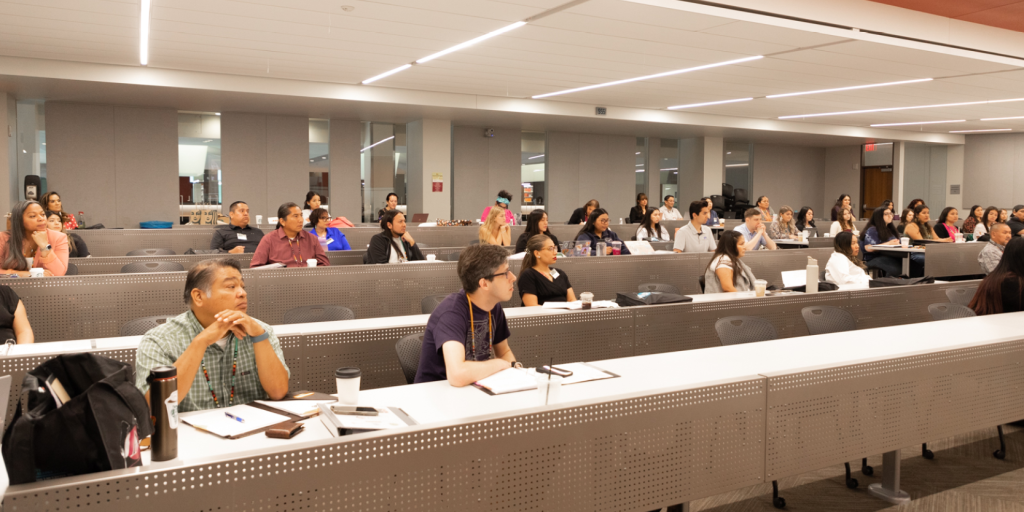
The ILP teamed up with its Native American Pathway to Law Initiative partners – University of California, Berkeley School of Law’s Admissions Office, Michigan State University College of Law’s Indigenous Law and Policy Center and Pre-Law Summer Institute, and American Indian Law Center, Inc. – and hosted its ninth annual Pathway to Law workshop at ASU Law. The program brought together 43 Native American students representing 30 tribes to learn about the law school admissions process, and tools and resources to support their law journey.
Stacy Leeds, Willard H. Pedrick Dean and Regents Professor of Law, gave a warm welcome to the class, discussed brief Indian Law history, and shared her wisdom and tips. Patty Ferguson-Bohnee, ILP Faculty Director, also extended a hearty welcome to the students.
Wenona Singel, Professor of Law and Associate Director of the Indigenous Law & Policy Center at Michigan State University (MSU Law) presented “Indigenizing the Legal Profession” and provided insight on Native American lawyers in the United States.
Kristen Theis-Alvarez, Dean of Admissions and Financial Aid at Berkeley Law, provided her expertise in several panels covering the law school admissions timeline and how to create a strong application packet.
To empower the students, Native law professionals Diandra Benally (’05), Torey Dolan (’19), Joseph Flies-Away (’04), Michelle Fox, Kiyoko Patterson (’03) and Denten Robinson presented on a panel “Why we need more Native attorneys.” Law students Gabe Dowell (2L), Keely Driscoll (2L), Shandiin Herrera (2L), Maryam Salazar (3L) and Berkeley Law 2L Robin Martinez shared their current experiences in law school during the panel presentation “Our journeys, in our own voices.” Both panel sessions were moderated by attorney Jeremy Aliason.
Simon Goldenberg (’17) and Cassondra Church discussed an overview of law school in their presentation “3 years in a Nut Shell.”
“One of the first courses you’re going to take in law school is Property Law,” said Professor Trevor Reed in his mock class. “It’s a complicated subject because it’s all about ownership.” Students were given cases to read and prepare for Professor Reed’s class and learned about briefing the case and best argument.
ILP Executive Director Kate Rosier and Theis-Alvarez co-presented “Choosing where to apply.”
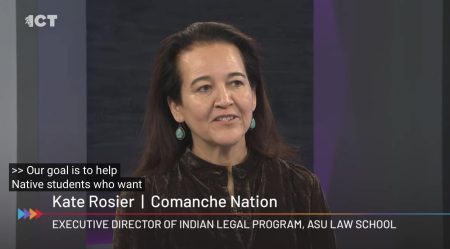
During the Pathway to Law Workshop, Rosier joined Indian Country Today and talked about the history of the Native American Pathway to Law Initiative and positive outcomes of the program.
Rodina Cave Parnall, Executive Director of the American Indian Law Center presented on “Extending the pipeline: an intro to PLSI.”
Joseph Lindsay, Director of Admissions and Operations at Berkeley Law, presented “Financial aid: resources and considerations for Native law students.”
We appreciate all of the partners, ILP faculty, staff and alumni, attorneys and law students for supporting these motivated Native American students and their bright future.
This was the largest workshop to date, congratulations to the Pathway to Law national team: Cassondra Church and Wenona Singel, Indigenous Law & Policy Center, Michigan State University College of Law; Joseph Lindsay and Kristin Theis-Alvarez, Berkeley Law; Rodina Cave Parnall (’01), American Indian Law Center, Inc.; and Kate Rosier, ILP at ASU Law.
ILC Wills and Probate: 2022-2023
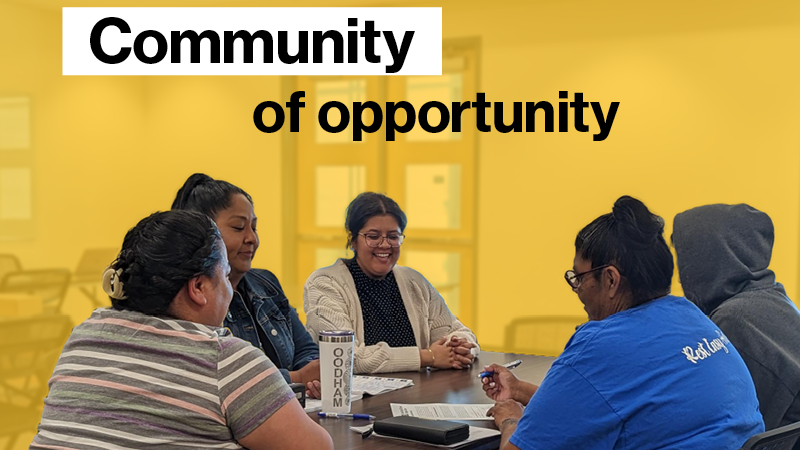
The Indian Legal Clinic continued its estate planning outreach for tribal citizens by providing five wills clinics over the 2022-2023 academic year. Clinic students assisted clients with the preparation of Indian wills and powers of attorney that conform to the requirements of federal, tribal, and state law. This year, they traveled five times and served four Tribal communities: the Pechanga Band of Indians in Temecula Valley in September and March, the Quechan Indian Tribe in Winterhaven, California in December, the Mashantucket Pequot Tribal Nation in Mashantucket, Connecticut in March, and the Gila River Indian Community in Lower San Tan Village, Arizona in March.
During a Wills and Probate Clinic
- Student attorneys meet with clients one-on-one on the first day to learn the client’s estate planning wishes. Students explain to the client their options under the American Indian Probate Reform Act and under tribal and state law, and then help the client finalize their choices.
- After the meetings for the day are over, the students draft the estate planning documents for the rest of the afternoon and into the evening. The documents prepared include wills and health care powers of attorney.
- The next morning, the students meet with their clients again to go over the prepared documents to make sure the will and power of attorney reflect what the client asked for.
- When the client is satisfied that the documents represent what they want, the client executes the documents before witnesses and notaries, meaning that the client leaves with finished legal documents.
Because the hours are long, students are usually tired by the end but also filled with a sense of accomplishment from handling what are often their first clients.
“One of my clients thought she wouldn’t be able to make certain critical decisions, but I was able to help her settle on what she wanted,” said student attorney Sukhleen Bahl (3L). “She was very happy when she left with a completed will and health care power of attorney.”
Tribal clients are also usually very happy to have a settled estate plan, sometimes first in their family to have one. They share their positive experience with family and friends, thus creating increased demand for the students’ estate planning services.
Advancing public service in Tribal Communities
11 students over the two semesters drafted 60 wills and 56 health care powers of attorney. Students during the fall semester – Samir Grover (2L), Erin Jenkins (2L), Courtney Kamauoha (3L), Molly Lathrop (3L), Julia Weiss (2L) and Joe Wilwerding (2L) – drafted 28 wills and 29 powers of attorney. Spring semester students – Sukhleen Bal (3L), Sierra Porritt (2L), Devorah Kalani (LLM), Christina Bustamante (2L), Hannah Dunham (3L) and returning veterans Kamauoha and Lathrop – drafted 32 wills and 27 powers of attorney.
In addition to helping clients with their estate plans through wills clinics, students also handle probate and estate administration cases. These are cases that are heard in Tribal court, before the Office of Hearing and Appeals (for AIPRA cases), and in State court. While assisting with their clients’ estate needs, student attorneys are exposed to a variety of issues: assisting a client with becoming a personal representative so the client can settle a loved one’s estate, helping a family distribute estate property in a way that is in keeping with the family’s cultural values versus the state’s intestacy plan, protecting inheritance rights, and settling claims with creditors.
“The wills clinics opened my eyes to the large need for those who know how to draft Indian wills to keep Native lands in the hands of the people to which they belong,” said Courtney Kamauoha (3L).
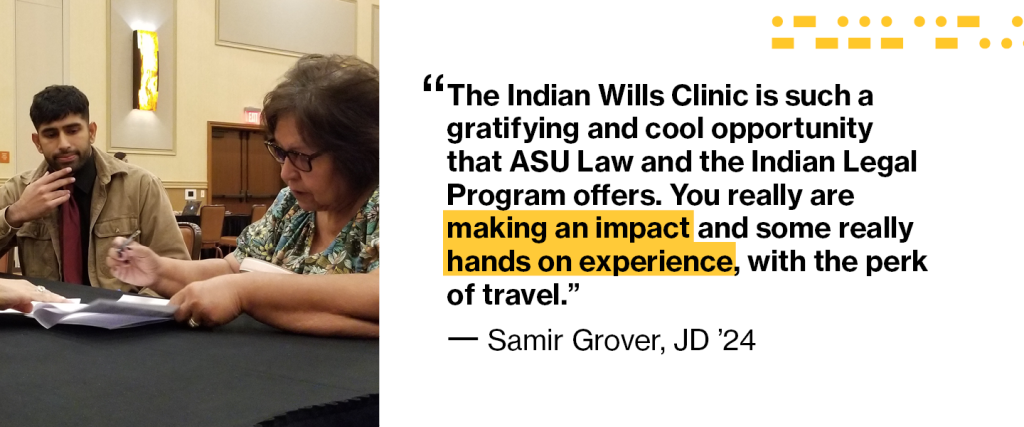
Enrolled in the Indian Wills and Probate clinic, ILP student Samir Grover (2L) enjoyed Professor Burtis’s class that he found intellectually challenging and motivating. “The client experience was incredibly rewarding and provided me with practical knowledge,” said Grover. “Professor Burtis ensures that the class sessions provide a baseline in Indian Law, Estates, and its interaction with AIPRA. She makes sure that student attorneys are fully prepared to meet with clients for drafting wills and we approach every case with not just knowledge but understanding on how to effectively interact and understandingly interact with clients, mostly elders, when helping them through a really significant and important process in advising them and drafting Indian Wills. My favorite part of the class was travelling to Pechanga and Quechan and meeting some amazing clients that it felt so gratifying to help in creating wills and ensuring their estates are protected according to their wishes. The Indian Wills Clinic is such a gratifying and cool opportunity that ASU Law and the Indian Legal Program offers. You really are making an impact and some really hands on experience, with the perk of travel.”
By providing an important service to tribal citizens who often have difficulty finding someone to represent them with estates that can encompass the three jurisdictions, students gain meaningful experience, a sense of purpose, and an opportunity to work in a variety of circumstances.
Repatriation of cultural objects
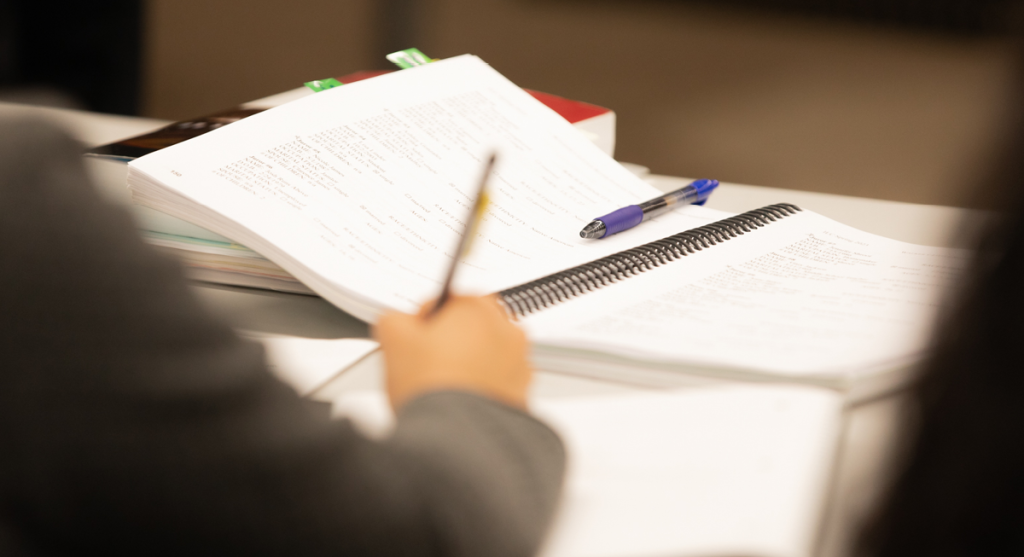
This year, the Indian Legal Clinic (ILC) student attorneys Brittany Habbart (3L) and Ruben Zendejas (3L) prepared a comment on the repatriation of cultural objects for a new Austrian repatriation project created by the Advisory Committee for Guidelines for Collections in Austrian Federal Museums from Colonial Contexts convened by the Federal Ministry of Arts, Culture, Civil Service and Sport (BMKÖS). BMKÖS requested comments and suggestions while Austria is considering new laws and policies about when to repatriate and the process of repatriation for a variety of materials. Certain items within Austria’s collections have a history of colonialism, violence, or otherwise did not have meaningful consent. The country has opened the important discussion about the way museums acquired their collections, including Austria’s federal museums, and how to address those items present-day.
The ILC comment suggests, “that meaningful repatriation policy consider all cultural items from historically colonized communities to be subject to and open for repatriation; make considerations for formally recognized indigenous governments, as well as other smaller indigenous communities and even, if necessary, individual claimants; and, the burden of proof be not placed solely on Indigenous communities, but on the western institutions themselves. Further we advise the museum to consider the possibility of digital repatriation — the authorization of licenses, copyrights, etc. — where physical repatriation is not wanted, needed, or possible.”
The Indian Legal Clinic worked with Professor Trevor Reed to prepare the comment.
____
Helen Burtis (’07)
Faculty Associate, Indian Legal Clinic, ASU Law
Learning in Alaska
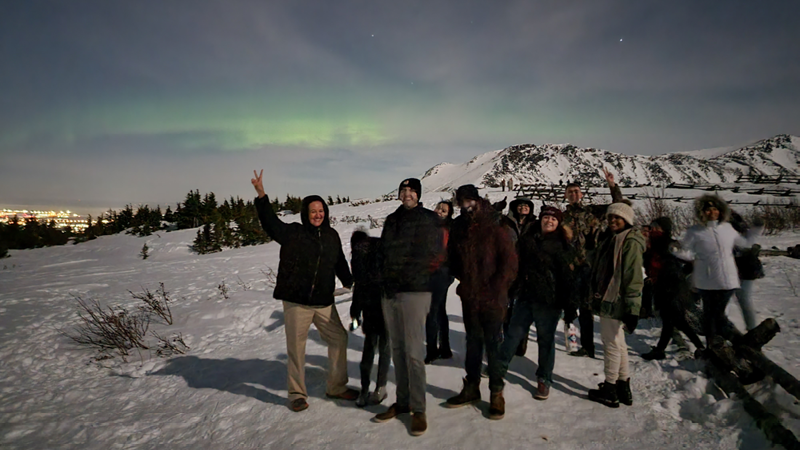
Partnership expands ILP Traveling Class
For spring break, 29 ASU Law students traveled to Anchorage, Alaska for the ILP traveling class Alaska Native Legal Issues and Solutions.
ASU Law and the Indian Legal Program (ILP) partnered with the Alaska Native Justice Center (ANJC) and the Cook Inlet Tribal Council, Inc. to offer this course. Alex Cleghorn, ANJC’s senior legal and policy director co-taught the class with Dean Stacy Leeds.
This week-long class exposed students to the culture, environment and unique legal issues of Alaska Native communities. Guest speakers, including ILP alumni Maude Blair (’02), Charlie Galbraith (’06) and Liz Medicine Crow (’05), presented on panels to share their insight and expertise. “What mostly resonated with me was applying a forward-looking approach to changing legislation instead of relying on legislative history to advocate for Native peoples,” said Maryam Salazar (2L).
On top of her course schedule and assignments, Ravynn Nothstine (3L) documented and shared her experience.
Read more in this ASU News article: Spring break trip to Alaska provides ASU students with firsthand look at Indigenous law
We appreciate our partners, hosts, presenters and alumni for making this an enriching experience. Thank you to our students, faculty and staff for documenting the first ILP traveling class in Alaska!
Honorable Peterson Zah’s advocacy and leadership
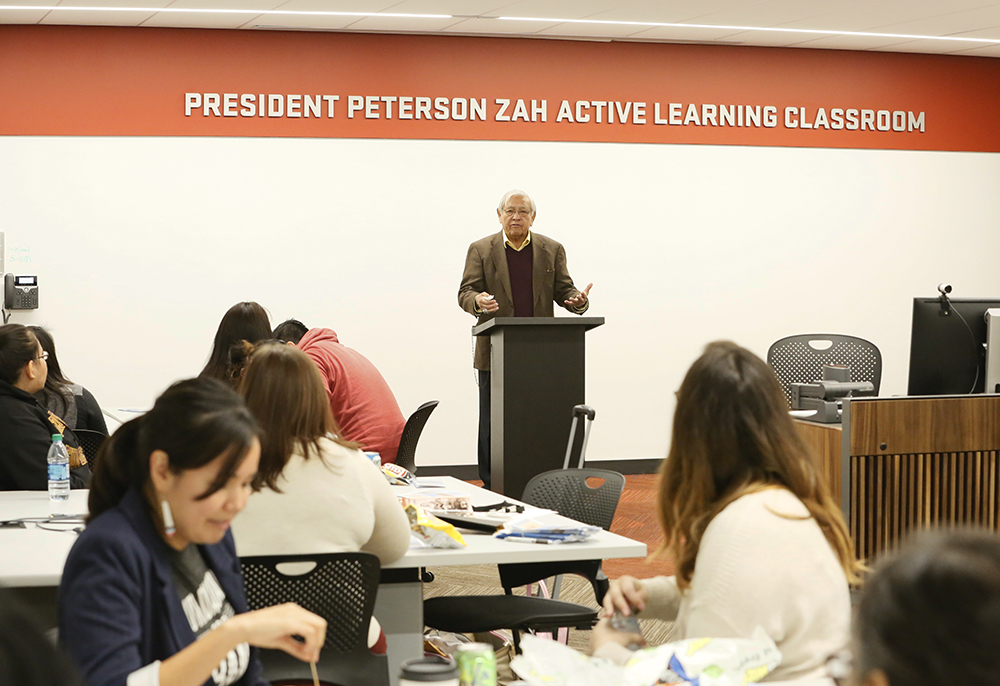
The late Honorable Peterson Zah was a dedicated leader to the Navajo Nation, ASU, the Indian Legal Program and all Native students. Zah was the First President and Last Chairman of the Navajo Nation. What many people do not realize is that Zah served as the Executive Director of the DNA People’s Legal Services for 14 years. Under Zah’s leadership several cases advancing tribal sovereignty went before the U.S. Supreme Court. In the early 1970s when Judge William C. Canby Jr. was teaching Indian Law at ASU and training talented Native students, Zah was fighting in the courts and seeing the need for Native attorneys. Zah worked with and hired some of ASU Law’s first Indian students taught by Judge Canby – Claudeen Bates Arthur (’74), Ben Hanley (’71), Louis Denetsosie (’74) and Herb Yazzie (’75) to name a few.
During Zah’s career he fought for education, helped raise funds for scholarships for Native students and encouraged students to go to law school. Zah was able to work with people at all levels of government to help his Nation. In 1995 Zah continued to use these skills at ASU to bridge the gap between Tribes and ASU. Zah personally helped secure the ASU Law/ Navajo Nation matching funds scholarship program to enable Navajo students to get an affordable legal education at ASU Law.
As a thank you for his service and his advocacy for tribes and tribal people, ASU Law honored President Peterson Zah in 2017 by announcing the naming of the “President Peterson Zah Active Learning Classroom.” The active learning classroom was selected for Zah because the room allows people to work together on projects and strategize to find solutions just as Zah did throughout his life. This room is located on the 3rd Floor of the Sandra Day O’Connor College of Law at ASU’s downtown Phoenix campus.
Honorable Peterson Zah’s advocacy, leadership and friendship will be missed but not forgotten.
Tribal Nations and Abortion Access: A Path Forward
These Indian Law Scholars joined forces and co-authored an article “Tribal Nations and Abortion Access: A Path Forward,” forthcoming in the Harvard Journal of Law and Gender. Currently available on the SSRN. This article outlines the legal realities of providing abortion care in Indian country, particularly in the context of avoiding state prohibitions. Abortion care is a fundamental human right of Indigenous people. The ability to safely end a pregnancy is consistent with Tribal conceptions of autonomy, privacy, and individual self-determination.
- Professor Lauren van Schilfgaarde, UCLA School of Law
- Professor Aila Hoss, Indiana University Robert H. McKinney School of Law
- Professor Ann E. Tweedy, University of South Dakota School of Law
- Professor Sarah Deer, The University of Kansas
- Professor Stacy Leeds, Sandra Day O’Connor College of Law

